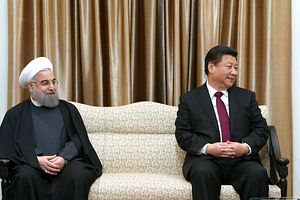On December 28, 2017, a mass protest against inflation and corruption broke out in Mashhad in east Iran. Within days, public anger has spread to the whole country while the protest themes have also expanded to criticizing the government and religious leaders.
The country’s current unrest has already drawn worldwide attention.
U.S. President Donald Trump tweeted about Iran both on January 1 and January 2, saying that “The great Iranian people have been repressed for many years. They are hungry for food & for freedom. Along with human rights, the wealth of Iran is being looted. TIME FOR CHANGE!”
Israeli Prime Minister Benjamin Netanyahu also wished “the Iranian people success in their noble quest for freedom” and predicted that the Iranian regime will fall one day.
In contrast, Beijing has taken a reserved pro-government stance.
At the regular press conference on January 2, China’s foreign ministry spokesperson Geng Shuang simply gave a one-sentence response when asked about Iran’s situation. He said,“China hopes that Iran can maintain stability and achieve development.”
Interestingly, while non-interference in other countries’ domestic affairs is China’s long-standing foreign policy, Geng’s current response toward the Iran protests was slightly but notably different from China’s rhetoric during the Zimbabwean coup. When the Zimbabwean military took control of the country and pulled down then-President Robert Mugabe from his post in November, 2017, Geng’s colleague Lu Kang said that “China believes that the Zimbabwe’s people are capable of maintaining the political stability and national development.”
Since Chinese President Xi Jinping took office in 2012, ties between China and Iran have grown. In January, 2016, Xi visited Tehran, marking the first visit to Iran by a Chinese president in 14 years. While there, Xi met with Ali Khamenei, the supreme leader of Iran, and Iranian President Hassan Rouhani.
Actively engaging Iran into his signature foreign policy, the Belt and Road Initiative (BRI) during his trip, Xi signed 17 multi-billion-dollar agreements with Rouhani in areas including energy, finance, investment, communications, culture, science and technology, and politics. Both countries also mapped out a broad cooperation plan for next 10 years.
In May 2017, when Rouhani won reelection, Xi also sent a congratulatory message to the Iranian president, saying that Beijing attaches “great importance to China-Iran relations and [is] willing to work with Iran to push forward the comprehensive strategic partnership,” according to China’s state media.
In June 2017, Xi sent his special envoy to Iran. According to Iran’s foreign ministry, Rouhani told the Chinese special envoy during the meeting that “Iran can be a trustable source of energy for China. The Islamic Republic of Iran has estimated more than $200 billion for projects in oil, gas and petrochemicals in its 5-year development plan and China can invest in these fields.”
On the sidelines of the United Nations General Assembly in New York in September, 2017, Rouhani reiterated his interest in joining China’s BRI. He said [all sic]:
About the Silk Road and the new plans that China has in this regard, we have talked about this issue several times with president Xi Jinping and Iran is willing to have its share and cooperation in this plan. The new Silk Road can be beneficial for economic interests of all countries that’s were a part of this road. We welcome this plan and we have discussed with Chinese authorities in this regard and we have plans about it.
Against the backdrop, a stable Iran under Rouhani’s administration apparently serves China’s interests best, even though it’s still uncertain what Iran’s turmoil will develop into in the near future.

































